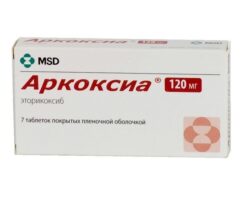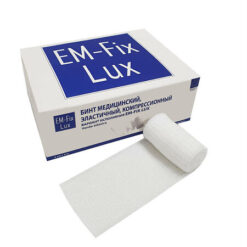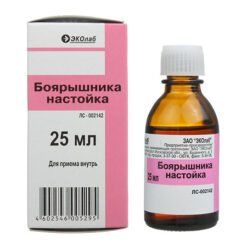-
×


-
×


-
×


Subtotal: €44.07






Subtotal: €44.07






Subtotal: €44.07
€20.19 €16.83
Captopril® is a combined drug with hypotensive and diuretic effects.
Captopril is an angiotensin-converting enzyme (ACE) inhibitor, reduces angiotensin II formation from angiotensin I, decreases aldosterone release, reduces total peripheral vascular resistance (TPR), blood pressure (BP), post- and preload. It dilates arteries more than veins.
It enhances coronary and renal blood flow. Long-term use reduces myocardial hypertrophy and arterial wall resistance. Captopril improves blood supply to ischemic myocardium; reduces platelet aggregation.
Hydrochlorothiazide is a thiazide diuretic of medium strength, reduces sodium ion reabsorption at the level of the cortical segment of the Genle loop. It does not affect acid-base status (COS). Lowers BP by changing the reactivity of the vascular wall, reducing the pressor effect of endogenous vasoconstrictors (adrenaline, noradrenaline) and increasing the depressor effect on the autonomic ganglia (to a lesser extent, by reducing circulating blood volume (CBV)). It enhances the hypotensive effect of captopril.
Diuretic effect is noted after 2 hours and reaches a maximum of 4 hours after oral administration. The action lasts for 6-12 hours. Efficacy and safety of captopril in children have not been established. Limited experience with captopril in children has been described in the literature.
Children, especially newborns, may be more susceptible to the development of hemodynamic side effects. Cases of excessive, prolonged and unpredictable increases in blood pressure, as well as related complications, including oliguria and seizures, have been reported.
Arterial hypertension (patients for whom combination therapy is indicated)
Capozide® is a combined drug that has a hypotensive and diuretic effect.
Captopril is an angiotensin-converting enzyme (ACE) inhibitor, reduces the formation of angiotensin II from angiotensin I, reduces the release of aldosterone, reduces total peripheral vascular resistance (TPVR), blood pressure (BP), post- and preload. Dilates arteries more than veins.
Strengthens coronary and renal blood flow. With long-term use, hypertrophy of the myocardium and the walls of resistant arteries decreases. Captopril improves blood supply to ischemic myocardium; reduces platelet aggregation.
Hydrochlorothiazide is a moderate-strength thiazide diuretic that reduces the reabsorption of sodium ions at the level of the cortical segment of the loop of Henle. Does not affect the acid-base state (ABS). Lowers blood pressure by changing the reactivity of the vascular wall, reducing the pressor effect of endogenous vasoconstrictors (adrenaline, norepinephrine) and enhancing the depressor effect on the autonomic ganglia (to a lesser extent, due to a decrease in circulating blood volume (CBV)). Strengthens the hypotensive effect of captopril.
The diuretic effect is observed after 2 hours and reaches a maximum 4 hours after oral administration. The action lasts for 6-12 hours. The effectiveness and safety of captopril in children have not been established. The literature describes limited experience with the use of captopril in children.
Children, especially neonates, may be more susceptible to developing hemodynamic side effects. There have been cases of excessive, prolonged and unpredictable increases in blood pressure, as well as associated complications, including oliguria and seizures.
At the beginning of treatment, an excessive decrease in blood pressure may be observed, especially in patients with chronic heart failure, severe arterial hypertension (including renal origin) and/or renal failure.
Before starting treatment, it is necessary to compensate for the deficiency of sodium ions and bcc (reduce the dose of previously prescribed diuretics or, in some cases, completely cancel them), and also determine indicators of kidney function.
Regular monitoring of plasma concentrations of potassium and calcium ions is necessary (especially in patients receiving treatment with digitalis preparations, glucocorticosteroids (GCS), often using laxatives, as well as in elderly patients), glucose, uric acid, lipids (cholesterol and triglycerides (TG)), urea and creatinine, and the activity of liver enzymes.
Particularly careful monitoring of blood pressure levels and laboratory parameters is necessary in the following cases: in patients with renal failure; patients with severe arterial hypertension (including renal origin); in elderly patients (over 65 years old); in patients with water-electrolyte imbalance and decompensated CHF; as well as those receiving simultaneously allopurinol, lithium salts, procainamide and drugs that reduce immunity.
If fever, swollen lymph nodes and/or signs of laryngitis and/or pharyngitis occur, the white blood cell count should be immediately determined.
During the treatment period, care must be taken when driving vehicles and engaging in other potentially hazardous activities that require increased concentration and speed of psychomotor reactions.
Hydrochlorothiazide, Captopril
One tablet contains:
active substances:
captopril in terms of 100% substance – 50 mg, hydrochlorothiazide in terms of 100% substance – 25 mg;
excipients:
microcrystalline cellulose – 118.5 mg,
pregelatinized starch (corn) – 30 mg,
stearic acid – 6 mg,
magnesium stearate – 0.3 mg,
lactose monohydrate – 70.2 mg.
Hypersensitivity to captopril, any other component of the drug or other ACE inhibitors, thiazide diuretics and other sulfonamide derivatives (cross-allergic reactions are possible);
hereditary or idiopathic angioedema, including a history of taking ACE inhibitors;
aortic stenosis,
mitral stenosis;
hypertrophic obstructive cardiomyopathy;
bilateral renal artery stenosis, renal artery stenosis of a single kidney;
kidney transplantation (in history);
chronic heart failure;
cardiogenic shock,
arterial hypotension,
severe liver failure (precoma or coma);
severe renal failure (serum creatinine more than 1.8 mg/100 ml or creatinine clearance less than 20-30 ml/min, anuria);
primary hyperaldosteronism;
simultaneous use with aliskiren and aliskiren-containing drugs in patients with diabetes mellitus or impaired renal function (GFR less than 60 ml/min),
pregnancy,
breastfeeding period,
age under 18 years (efficacy and safety have not been established),
lactose intolerance, lactase deficiency and glucose-galactose malabsorption syndrome.
With caution
• Liver dysfunction, progressive liver diseases,
• moderate renal failure (creatinine clearance 30-60 ml/min),
• proteinuria (more than 1 g/day),
• hypokalemia (not corrected by drugs);
• hyponatremia,
• hypovolemia,
• hypercalcemia,
• gout, hyperuricemia,
• systemic connective tissue diseases and other autoimmune diseases (including systemic lupus erythematosus, scleroderma, periarteritis nodosa);
• old age (over 65 years),
• simultaneous administration of drugs that suppress the body’s defense reactions (glucocorticosteroids, cytostatics, immunosuppressants), allopurinol, procainamide;
• surgery/general anesthesia, use in black patients, hemodialysis using high-strength membranes (for example, AN69®), desensitization therapy, simultaneous use of potassium-sparing diuretics, potassium supplements, potassium-containing substitutes and lithium, acute myopia and secondary angle-closure glaucoma.
From the urinary system: proteinuria; in rare cases, especially in patients with renal failure, there may be an increase in serum concentrations of urea, creatinine and potassium ions (the risk of hyperkalemia is also increased in patients with diabetes), as well as hyponatremia.
Increases the neurotoxicity of salicylates, the effect of competitive muscle relaxants, ethanol. Reduces the excretion of quinidine, the effect of oral hypoglycemic drugs (drugs), norepinephrine, epinephrine and anti-gout drugs.
Capozide increases the concentration of digoxin in the blood plasma by 15-20% and increases the bioavailability of propranopol. The risk of developing immunosuppressive effects increases when combined with procainamide, as well as drugs that block tubular secretion (reducing the number of leukocytes and granulocytes).
Increases the side effects of cardiac glycosides, especially when administered simultaneously with drugs that increase the excretion of potassium and magnesium ions and/or retain calcium ions (for example, diuretics, adrenal hormones, laxatives, amphotericin B, carbenoxolone, penicillin G, salicylates). Cimetidine, slowing down the metabolism of captopril in the liver, increases its concentration in plasma.
The severity of side effects may increase.
Treatment: symptomatic therapy.
The drug should be stored in a dry place, protected from light, out of reach of children, at a temperature not exceeding 20°C.
3 years.
Akrikhin JSC, Russia
| Shelf life | 3 years. |
|---|---|
| Conditions of storage | The drug should be stored in a dry place protected from light, out of reach of children, at a temperature not exceeding 20 ° C. |
| Manufacturer | Akrihin HFC JSC, Russia |
| Medication form | pills |
| Brand | Akrihin HFC JSC |
Buy Caposide, tablets 50 mg + 25 mg 28 pcs. with delivery to USA, UK, Europe and over 120 other countries.